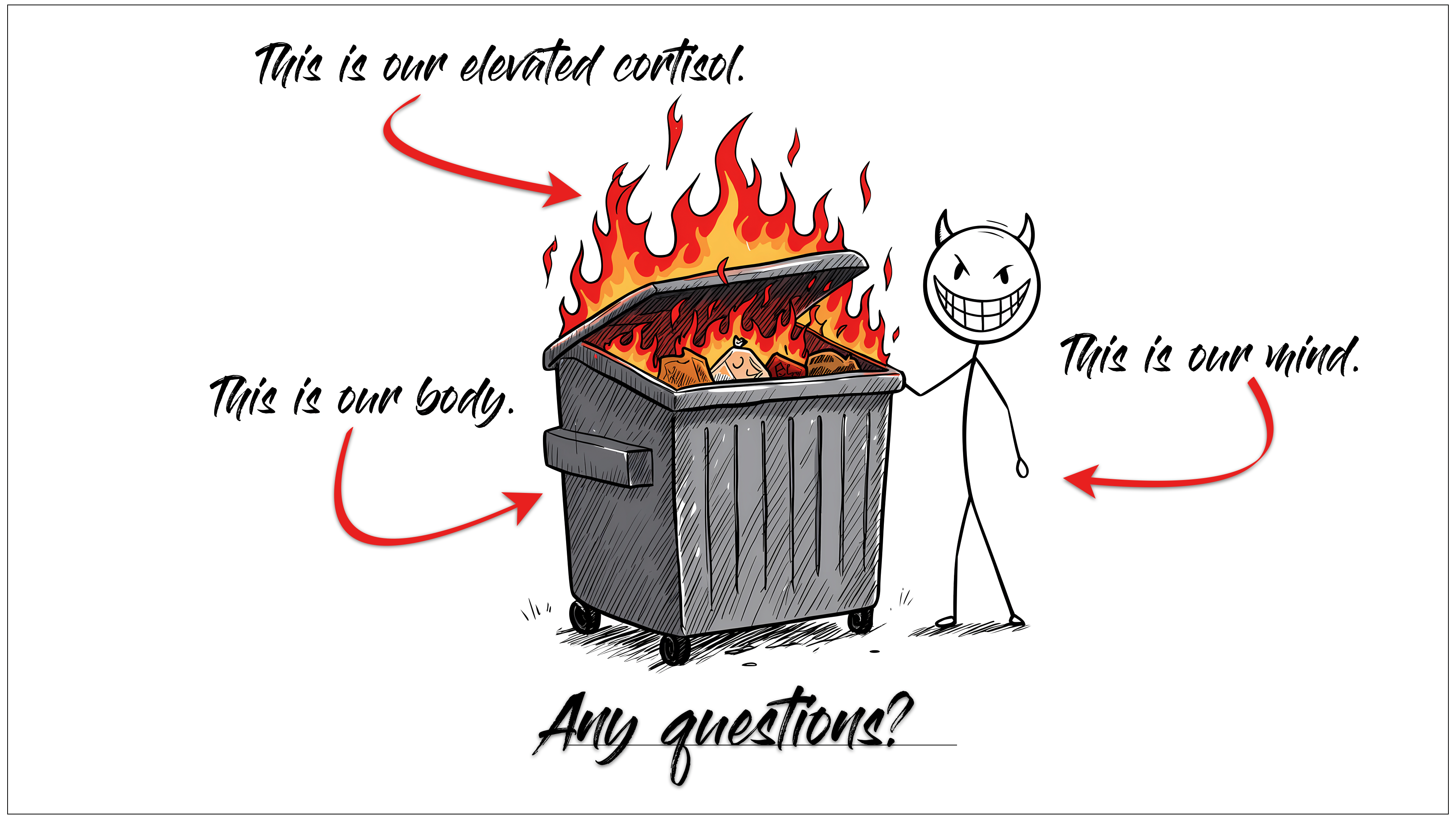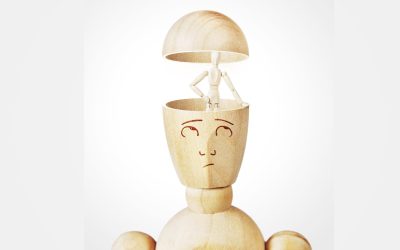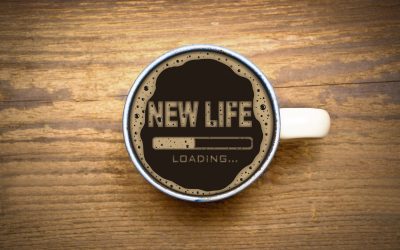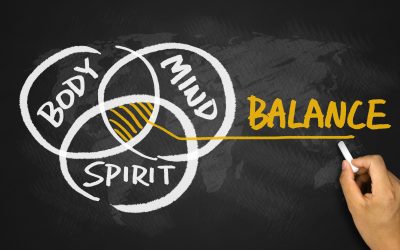Practicing Perspective for Chronic Stress: Cortisol and Dumpster Fires

TURNS OUT, THE ADRENAL GLANDS ARE JUST THE MIDDLEMAN
Perspectives are not only seen with the eye, they are also held in the mind; they’re often deeply rooted beliefs. So practicing perspective is an activity of regulating the mind consciousness muscle – a.k.a. dumpster fire prevention.
This is particularly critical/relevant when it comes to chronic stress. Certain thoughts or perspectives have the power to turn up the dial of stress throughout our whole bodily system – from something that only exists in the mind. Yeah, turns out, the adrenal glands are just the middleman – it’s your mind’s idea to freak out and drag your body along for the ride.
Yoga, as my teachers have taught, is about the freedom and empowerment to change the lens by which we view our world, a situation, a relationship, problem, or person. When you experience harmful stress – or suffering – why not take a page out of the playbook of traditional problem-solving and “think outside the box”?
And we want to be careful not to mistake practicing perspective with ‘analysis paralysis’. This process goes deeper.
MIND, BODY AND SPIRIT IS MORE THAN JUST A TAGLINE
It’s being more fully human – even in the midst of a sh*tshow. When we perceive or believe something fearful that has not yet happened – something not currently rooted in reality, we suffer. When we constantly loop hurtful memories or replay unsettling situations in our mind that occurred in the past, we suffer. Any time our mind likes to play with matches around a dumpster full of garbage a.k.a. unfounded truths or judgments, we suffer.
Yoga Sutra 1.4:
When the mind is not controlled (harnessed, mastered), the true self becomes identified with the changing states of the mind (i.e. the narratives or stories of the mind).
Yoga Sutra 1.8:
When we perceive something incorrectly (i.e. narrative loops or stories of the mind), it leads us to believe something false, which in turn causes mental disturbance – a.k.a. suffering.
Looping narratives of worry or fear – recounting stories that no longer exist, causes a neurological chain reaction beginning in the brain and linked to the system in our body that generates cortisol.
Cortisol is a hormone produced by the adrenal glands in response to stress. Healthy stress is needed for various bodily functions to some degree, including regulating metabolism, reducing inflammation, and controlling the body’s sleep-wake cycle, as examples.
Excessive or constant cortisol in your system is considered chronic stress – unhealthy stress, and is linked to heart disease, diabetes, weight gain, anxiety and more. These illnesses are indicative of imbalance and cortisol is often the flame bringing your body to a boiling point.
Becoming aware of the narrative in your mind and freeing your perspective, even for just one minute of rapid fire alternative possibilities or fact-checking, is a powerful position for you to work from when managing stress from anxiety, shame, anger and worry, in particular. This active awareness, this mind-body connection is chapter one in the SOP manual of being more fully human, presenting new logic for our brains.
“A man is but the product of his thoughts. What he thinks, he becomes.”
Feel this wisdom in your own body, during periods of excessive stress or high pressure. Heart palpitations, burning tension in your neck and shoulders, forgetfulness when multitasking and tears of frustration are wisdom from the body; the ways it is communicating with us. “Slow down, breathe, step away, think outside the box, practice perspective.”
What blocks our ability to down-regulate our own nervous system is the influence of thoughts or stories looping in the mind, as we learn from Sutra 1.4. When we choose to follow a culture of comparative expectations and social media soundbites and endless deadlines, we miss the opportunity to press pause, to reduce systemic stress, to find clarity.
PRACTICING PERSPECTIVE AS A LIFESTYLE REFLEX
Managing our mind/mindset is what happens when we change the lens in which we are currently using to view a situation – or think outside the box.
- Cultural conditioning and emotional habits affect the neuron activity in the brain.
- Neurological wiring is simply how the brain develops, changes, and adapts over time, often in response to experiences, learning, and environmental or cultural factors.
When we pause to practice perspective, we are activating the neuroplasticity of the mind, which is the brain’s ability to reorganize itself by forming new neural connections – and possibly new beliefs. Think of it like an app developer fixing bugs.
We are empowered to react differently than usual, and over time we will feel differently, too. It’s also no different than strengthening or working any other muscle in the body – it takes practice. Additional yoga tools, such as breath work and movement, will also help to activate the parasympathetic part of our nervous system, which reduces cortisol.
Practicing awareness first is a sort of muscle of the mind that we learn from yoga. Just like bicep reps and lunges recondition muscles of the body, pausing to notice how your thoughts are making you feel is the first step of re-conditioning your mind. Practicing Perspective as a reflex to that awareness is one of many ways you can practice yoga without stepping onto the mat or going to a class.
Suffering is Optional
To Klesha is To Human The Five kleshas (Yoga Sutra 2.3) are mental afflictions or obstacles that cloud the lens through which we are currently viewing a situation, person, or thing, and keep us stuck in cycles of suffering. We are all born with these kleshas. This...
Rapidfire Research on Meditation
Alright, so research is super boring to many of us in jobs without goggles and white lab coats, but….. Spoiler Alert! Meditation offers a multitude of health benefits, encompassing both mental and physical well-being – and including both structural and functional changes to certain brain regions.
Asmita: The Ego That Thinks It’s the Star of the Show
The 2nd Klesha is Asmita: Yoga, Ego, and the Art of not Being a Self-Centered Diva or Jerk. We’ll cover each of the five kleshas in this series about why Suffering is Optional.
Avidya: Because Who Doesn’t Love a Good Delusion?
The 1st Klesha is Avidya: It’s the queen of the kleshas, ground zero of all the other kleshas. We’ll cover each of the five kleshas in this series about why Suffering is Optional.
Yoga as Lifestyle Medicine
Sustained or chronic cortisol levels put us on a path to a long list of health risks and disease. The Niyamas help us understand how we are empowered to manage stress in the mind – and, thus, manage our cortisol levels naturally.
Relationships Are Primary, Everything Else is Derivative
My aha moment could be yours too.
The first time I realized how yoga was actually working in my life – off the mat, beyond the body – was noticing how I felt in my…
Cognitive Behavioral Therapy and the Yoga Sutras
As we look closely at one of the more common methods (practices) of psychology being Cognitive Behavioral Therapy (CBT), we can find a significant amount of overlap with Yoga.






